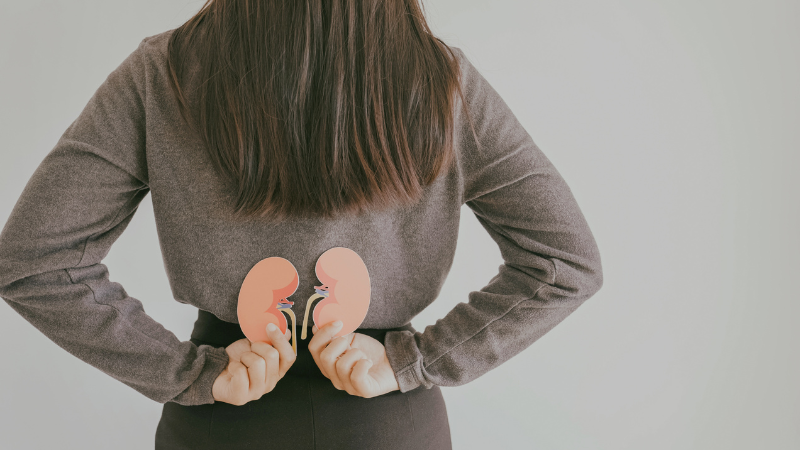Why Are the Twins So Important?
Most people understand that a major function of the kidneys is to remove waste products and excess fluid from the body. This process is necessary to maintain a stable balance of body chemicals. These waste products and excess fluid are removed through the urine. Urine contains the byproducts of metabolism – salts, toxins, and
water – that end up in the blood. Without the kidneys, waste products and toxins would soon build up in the blood to dangerous levels.
The kidneys also regulate many important body functions. They:
-
-
remove drugs from the body
-
release hormones that regulate blood pressure
-
produce an active form of vitamin D that promotes strong, healthy bones
-
control the production of red blood cells
When your health care provider obtains a urine sample, the results can tell how well the kidneys are working. For example, blood, protein, or white blood cells in the urine may indicate injury, inflammation, or infection of the kidneys, and glucose in the urine may be an indication of diabetes mellitus.
Where are the Twins and What are they made of?
The kidneys are located just under the ribcage in the back, one on each side. The right kidney is positioned below the liver, so it’s a little lower than the left one. A layer of fat surrounds the kidneys to cushion and help hold them in place. Each adult kidney is about the size of a fist. The outer layer is called the cortex, which contains the filtering units. The center part of the kidney, the medulla has 10 to 15 fan-shaped structures called pyramids. Each kidney contains up to a million functioning units called nephrons. A nephron consists of a filtering unit of tiny blood vessels called a glomerulus attached to a tubule. When blood enters the glomerulus, it is filtered and the remaining fluid then passes along the tubule. In the tubule, chemicals and water are either added to or removed from this filtered fluid according to the body’s needs, the final product being the urine we excrete. The kidneys perform their life-sustaining job of filtering and returning to the bloodstream about 200 quarts of fluid every 24 hours. About two quarts are removed from the body in the form of urine, and about 198 quarts are recovered. The urine we excrete has been stored in the bladder for anywhere from 1 to 8 hours.

What Are Some of the Causes of Kidney Disease?
Kidney disease is defined as having some type of kidney abnormality, or “marker”, such as protein in the urine and having decreased kidney function. The kidneys may be affected by diseases such as diabetes and high blood pressure. Some kidney conditions are inherited (run in families).
Diabetes
Diabetes is a disease in which your body does not make enough insulin or cannot use normal amounts of insulin effectively. This results in a high blood sugar level, which can cause problems in many parts of your body including the kidneys. Diabetes is the leading cause of kidney disease. High levels of blood sugar make the kidneys filter too much blood. In time, the stress of the overwork causes the kidneys to lose their filtering ability. After many years, they start to leak and useful protein is lost in the urine. Waste products then start to build up in the blood. Finally, the kidneys fail.
High Blood Pressure
High blood pressure (also known as hypertension) is another common cause of kidney disease. High blood pressure occurs when the force of blood against your artery walls increases. When high blood pressure is controlled, the risk of complications such as chronic kidney disease is decreased.
Glomerulonephritis
Glomerulonephritis is a disease that causes inflammation of the kidney’s tiny filtering units. Glomerulonephritis may happen suddenly, for example, after a strep throat, and the individual may get well again. However, the disease may develop slowly over several years and it may cause progressive loss of kidney function.
Drugs and Toxins
Drugs and toxins can also cause kidney problems. Using large numbers of over-the-counter pain relievers for a long time may be harmful to the kidneys. Certain other medications, toxins, pesticides, and “street” drugs such as heroin and crack can also cause kidney damage.
Take care of your Twins (kidneys):
a. Have an adequate daily water intake. Drink half your weight in ounces For example: if you weigh 200lbs, drink 100oz. of water.
b. If you have a chronic illness, such as Diabetes and/or Hypertension, please keep your condition well managed. Blood Pressure readings should be under 120/80 and Fasting Blood Glucose readings- 70-110.
c. And finally, nourish your twins with a healthy and balanced diet that includes the proper amount of fruits and vegetables.
Source:
“How Your Kidneys Work.” National Kidney Foundation, Inc. August, 2011. New York: NY.




